Editorial Board
Our Editorial Board Members are active researchers recognized as experts in their field. They handle manuscripts within their areas of expertise, overseeing all aspects of the peer review process from submission to acceptance.
Editorial Board Members work closely with our in-house editors to ensure that all manuscripts are subject to the same editorial standards and journal policies.
For past members of our Editorial Board, please see our Editorial Board Alumni page.
Christian Agatemor, PhD, University of Miami, USA
 Dr Christian Agatemor is an Assistant Professor of Chemistry at the University of Miami, where he conducts research at the interface of chemistry and biology. He received his Ph.D. in Chemistry at the University of Prince Edward Island, Canada, developing bioactive dendrimers to mitigate drug-resistant microbial infections. He then conducted postdoctoral research at the Harvard University School of Engineering and Applied Sciences and the Johns Hopkins University School of Medicine in the United States. His expertise includes metabolic glycoengineering, the design of bioorthogonal chemical reporters to study posttranslational modifications, and the delivery of biologics. He started his independent career in August 2021, leading a research group that seeks to develop bioorthogonal chemical reporters to study posttranslational modifications, specifically protein glycosylation and lactylation. A key aspect of his research focuses on investigating how lactylation, the modification of proteins with L-lactate-derived L-lactyl units, influences cell transformation and differentiation, processes with implications for many diseases. In parallel, his research group is developing deep eutectic solvents for drug delivery and biomaterials for tissue engineering . Dr. Agatemor received the Natural Sciences and Engineering Research Council of Canada's postdoctoral fellowship.
Dr Christian Agatemor is an Assistant Professor of Chemistry at the University of Miami, where he conducts research at the interface of chemistry and biology. He received his Ph.D. in Chemistry at the University of Prince Edward Island, Canada, developing bioactive dendrimers to mitigate drug-resistant microbial infections. He then conducted postdoctoral research at the Harvard University School of Engineering and Applied Sciences and the Johns Hopkins University School of Medicine in the United States. His expertise includes metabolic glycoengineering, the design of bioorthogonal chemical reporters to study posttranslational modifications, and the delivery of biologics. He started his independent career in August 2021, leading a research group that seeks to develop bioorthogonal chemical reporters to study posttranslational modifications, specifically protein glycosylation and lactylation. A key aspect of his research focuses on investigating how lactylation, the modification of proteins with L-lactate-derived L-lactyl units, influences cell transformation and differentiation, processes with implications for many diseases. In parallel, his research group is developing deep eutectic solvents for drug delivery and biomaterials for tissue engineering . Dr. Agatemor received the Natural Sciences and Engineering Research Council of Canada's postdoctoral fellowship.
Lab webpage
Hind Al-Abadleh, PhD, Wilfrid Laurier University, Canada
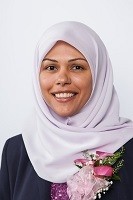 Dr Al-Abadleh is a Full Professor in the Department of Chemistry and Biochemistry at Wilfrid Laurier University in Waterloo, Ontario, Canada. She is the 2021-2022 University Research Professor at Laurier and Research Ambassador for Environments and Sustainability. She established the EPIC lab for Environmental, Physical and Interfacial Chemistry research in the fields of atmospheric aerosol chemistry, air quality, geochemistry, and environmental remediation using nanomaterials. She started her academic career in Canada in 2005 following a PhD (1999-2003) and postdoctoral training (2003-2005) in environmental physical chemistry at the University of Iowa and Northwestern University in the United States. In 2019, Dr. Al-Abadleh received the Fulbright Canada Visiting Research Chair in Atmospheric Chemistry, Air Quality, and Climate Change at the University of California Irvine. In 2020, she was appointed Fellow at the Balsillie School of International Affairs. Her achievements and leadership roles capitalize on her research expertise and skills in knowledge mobilization and include several organizations beyond the university where she works: the Chemical Institute of Canada (CIC), Nano Ontario, special interests group Atmosphere-Related Research in Canadian Universities (ARRCU), and Nano Canada.
Dr Al-Abadleh is a Full Professor in the Department of Chemistry and Biochemistry at Wilfrid Laurier University in Waterloo, Ontario, Canada. She is the 2021-2022 University Research Professor at Laurier and Research Ambassador for Environments and Sustainability. She established the EPIC lab for Environmental, Physical and Interfacial Chemistry research in the fields of atmospheric aerosol chemistry, air quality, geochemistry, and environmental remediation using nanomaterials. She started her academic career in Canada in 2005 following a PhD (1999-2003) and postdoctoral training (2003-2005) in environmental physical chemistry at the University of Iowa and Northwestern University in the United States. In 2019, Dr. Al-Abadleh received the Fulbright Canada Visiting Research Chair in Atmospheric Chemistry, Air Quality, and Climate Change at the University of California Irvine. In 2020, she was appointed Fellow at the Balsillie School of International Affairs. Her achievements and leadership roles capitalize on her research expertise and skills in knowledge mobilization and include several organizations beyond the university where she works: the Chemical Institute of Canada (CIC), Nano Ontario, special interests group Atmosphere-Related Research in Canadian Universities (ARRCU), and Nano Canada.
Lab webpage
Jennifer Bridwell-Rabb, PhD, University of Michigan, USA
orcid.org/0000-0002-7437-6217 Dr Jennifer Bridwell-Rabb is an Assistant Professor in the Department of Chemistry at the University of Michigan, Ann Arbor. Her research group studies the oxygen-dependent and oxygen-independent mechanisms of enzymes that catalyze a wide-range of site-specific chemistry using enzymology, structural biology, and metalloprotein expertise. Her laboratory is particularly interested in the transformations catalyzed by the Rieske non-heme oxygenase enzymes, the metalloprotein chemistry required to build, modify, and degrade photosynthetic pigments, and the strategies that photosynthetic organisms use to adapt to environments that differ in oxygen- and light-availability. Jennifer earned her Ph.D. in Chemistry at Texas A&M University in the laboratory of David Barondeau. She was an HHMI-NIH postdoctoral fellow in Catherine Drennan’s laboratory at the Massachusetts Institute of Technology. As an independent investigator, Jennifer has received the Beckman Young Investigator Award, the Searle Scholars Award, the Ralph E. Powe Junior Faculty Enhancement Award, and the Department of Energy Early Career Award.
Dr Jennifer Bridwell-Rabb is an Assistant Professor in the Department of Chemistry at the University of Michigan, Ann Arbor. Her research group studies the oxygen-dependent and oxygen-independent mechanisms of enzymes that catalyze a wide-range of site-specific chemistry using enzymology, structural biology, and metalloprotein expertise. Her laboratory is particularly interested in the transformations catalyzed by the Rieske non-heme oxygenase enzymes, the metalloprotein chemistry required to build, modify, and degrade photosynthetic pigments, and the strategies that photosynthetic organisms use to adapt to environments that differ in oxygen- and light-availability. Jennifer earned her Ph.D. in Chemistry at Texas A&M University in the laboratory of David Barondeau. She was an HHMI-NIH postdoctoral fellow in Catherine Drennan’s laboratory at the Massachusetts Institute of Technology. As an independent investigator, Jennifer has received the Beckman Young Investigator Award, the Searle Scholars Award, the Ralph E. Powe Junior Faculty Enhancement Award, and the Department of Energy Early Career Award.
Lab webpage
Claudia Bonfio, PhD, University of Strasbourg, France
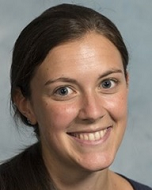 Dr Claudia Bonfio was born in Siena, a beautiful medieval city in Tuscany, mostly known for the wine produced in the surroundings. She completed her BSc and MSc studies in Chemistry and her PhD in Biomolecular Sciences in late 2017, working on the origin and catalytic activity of ancient proteins. Later, as a Marie Sklodowska Curie Fellow, she joined the MRC Laboratory of Molecular Biology, where she looked into the chemical origin of modern cells. After a short stay at the University of Cambridge as an 1851 Research Fellow, exploring prebiotic membrane signalling, she moved to ISIS in Strasbourg to start her research group. Her group is currently working on the design and development of functional primitive cells capable of Darwinian evolution.
Dr Claudia Bonfio was born in Siena, a beautiful medieval city in Tuscany, mostly known for the wine produced in the surroundings. She completed her BSc and MSc studies in Chemistry and her PhD in Biomolecular Sciences in late 2017, working on the origin and catalytic activity of ancient proteins. Later, as a Marie Sklodowska Curie Fellow, she joined the MRC Laboratory of Molecular Biology, where she looked into the chemical origin of modern cells. After a short stay at the University of Cambridge as an 1851 Research Fellow, exploring prebiotic membrane signalling, she moved to ISIS in Strasbourg to start her research group. Her group is currently working on the design and development of functional primitive cells capable of Darwinian evolution.
Lab webpage
Indranath Chakraborty, PhD, Indian Institute of Technology Kharagpur, India
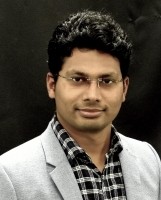 Dr Indranath Chakraborty is an Assistant Professor in the School of Nano Science and Technology at the Indian Institute of Technology Kharagpur, India. His research group investigates the emerging properties of atomically precise nanoparticles, structure-property correlations, and their functions. He obtained his Ph.D. in 2015 from the Indian Institute of Technology, Madras (India). He was then a postdoctoral research associate at the University of Illinois at Urbana–Champaign, IL, USA. In 2016, he moved to Philipps University of Marburg, Germany, as an Alexander von Humboldt Postdoctoral Research Fellow. In 2018, he moved to the Center for Hybrid Nanostructure, University of Hamburg, Germany as a research associate. Before Joining IIT Kharagpur (2022), he was an Assistant Professor in the School of Basic Sciences at IIT Mandi (India). He has received numerous awards for his research contributions, including the Humboldt Fellowship, Malhotra Weikfield Foundation Nano Science Fellowship Award, and J. C Bose patent award.
Dr Indranath Chakraborty is an Assistant Professor in the School of Nano Science and Technology at the Indian Institute of Technology Kharagpur, India. His research group investigates the emerging properties of atomically precise nanoparticles, structure-property correlations, and their functions. He obtained his Ph.D. in 2015 from the Indian Institute of Technology, Madras (India). He was then a postdoctoral research associate at the University of Illinois at Urbana–Champaign, IL, USA. In 2016, he moved to Philipps University of Marburg, Germany, as an Alexander von Humboldt Postdoctoral Research Fellow. In 2018, he moved to the Center for Hybrid Nanostructure, University of Hamburg, Germany as a research associate. Before Joining IIT Kharagpur (2022), he was an Assistant Professor in the School of Basic Sciences at IIT Mandi (India). He has received numerous awards for his research contributions, including the Humboldt Fellowship, Malhotra Weikfield Foundation Nano Science Fellowship Award, and J. C Bose patent award.
Lab webpage
Jeff Chan, PhD, University of Illinois Urbana-Champaign, USA
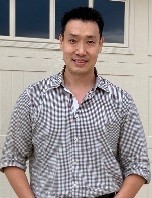 Prof Jeff Chan began his independent career in 2014 and was promoted to the rank of Associate Professor in 2021. He is a member of the Beckman Institute for Advanced Science and Technology where he is the current leader of the Photoacoustic Imaging work group. His research interests include the development of photoacoustic probes, design of tools to study the chemical biology of aging, and the application of new reactions for targeted drug delivery.
Prof Jeff Chan began his independent career in 2014 and was promoted to the rank of Associate Professor in 2021. He is a member of the Beckman Institute for Advanced Science and Technology where he is the current leader of the Photoacoustic Imaging work group. His research interests include the development of photoacoustic probes, design of tools to study the chemical biology of aging, and the application of new reactions for targeted drug delivery.
Lab webpage
François-Xavier Coudert, PhD, French National Centre for Scientific Research, France
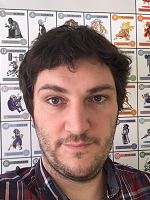 Dr Coudert is a Researcher at the French National Centre for Scientific Research (CNRS, France), where his group applies computational chemistry methods at various scales to investigate the physical and chemical properties of nanoporous materials, and in particular stimuli-responsive materials with anomalous behaviour. He obtained his PhD from the University Paris-Sud (France) in 2007, for his work on the properties of water and solvated electrons confined in zeolite nanopores. He worked as post-doctoral researcher at University College London (UK) on the growth of metal-organic frameworks on surfaces, before joining CNRS in 2008. FX has received the Early-Career Researcher award from the French Physical Chemistry division, was named a Distinguished Junior Member of the French Chemical Society, and was awarded the 2018 International Award for Creative Work by the Japan Society of Coordination Chemistry.
Dr Coudert is a Researcher at the French National Centre for Scientific Research (CNRS, France), where his group applies computational chemistry methods at various scales to investigate the physical and chemical properties of nanoporous materials, and in particular stimuli-responsive materials with anomalous behaviour. He obtained his PhD from the University Paris-Sud (France) in 2007, for his work on the properties of water and solvated electrons confined in zeolite nanopores. He worked as post-doctoral researcher at University College London (UK) on the growth of metal-organic frameworks on surfaces, before joining CNRS in 2008. FX has received the Early-Career Researcher award from the French Physical Chemistry division, was named a Distinguished Junior Member of the French Chemical Society, and was awarded the 2018 International Award for Creative Work by the Japan Society of Coordination Chemistry.
Lab webpage
Read our interview with FX here.
Katrin Erath-Dulitz, PhD, University of Innsbruck, Austria
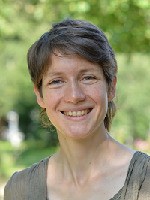 Dr Erath-Dulitz is Assistant Professor of Physics at Universität Innsbruck (Austria), where her research deals with the study of chemical reactions in a regime dominated by quantum effects in order to understand fundamental reaction mechanisms as well as the chemical evolution in space. She received her DPhil from the University of Oxford (UK) in 2015, for her work on the magnetic deceleration of supersonic beams for cold and controlled chemistry studies in ion traps. After a postdoc at ETH Zurich (Switzerland) on the high-resolution molecular spectroscopy of molecular cations, she continued in the field of cold and controlled chemistry at the University of Freiburg (Germany), with a focus on chemistry experiments with ultracold atoms and doped helium nanodroplets, respectively. From 2018-2022, she was a Liebig Fellow of the Union of Chemical Industry. In 2022, she was also a Fraunhofer Attract group leader in the field of laser-matter interaction at the Fraunhofer Institute for Solar Energy Systems (Fraunhofer ISE) in Freiburg.
Dr Erath-Dulitz is Assistant Professor of Physics at Universität Innsbruck (Austria), where her research deals with the study of chemical reactions in a regime dominated by quantum effects in order to understand fundamental reaction mechanisms as well as the chemical evolution in space. She received her DPhil from the University of Oxford (UK) in 2015, for her work on the magnetic deceleration of supersonic beams for cold and controlled chemistry studies in ion traps. After a postdoc at ETH Zurich (Switzerland) on the high-resolution molecular spectroscopy of molecular cations, she continued in the field of cold and controlled chemistry at the University of Freiburg (Germany), with a focus on chemistry experiments with ultracold atoms and doped helium nanodroplets, respectively. From 2018-2022, she was a Liebig Fellow of the Union of Chemical Industry. In 2022, she was also a Fraunhofer Attract group leader in the field of laser-matter interaction at the Fraunhofer Institute for Solar Energy Systems (Fraunhofer ISE) in Freiburg.
Lab webpage
Felipe García, PhD, Monash University, Australia
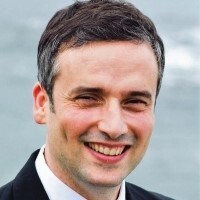 Felipe García is originally from the coastal town of Gijón (Asturias, Spain) and earned his BSc and MSc degrees in Chemistry at the local Oviedo University. In 2001, he moved to the University of Cambridge to pursue his graduate studies on main group imides and phosphides as a Cambridge European Trust and Newton Trust Scholar under the supervision of Prof. Dominic Wright. He then obtained a Junior Research Fellowship at Wolfson College (2005) and was appointed a College Lecturer in Inorganic Chemistry at Newnham and Trinity Colleges (2006) before joining Nanyang Technological University (Singapore) in 2011 as an Assistant Professor. In 2022, he returned to his alma mater under the Margarita Salas Senior Talent Attraction program funded by the Foundation for the Promotion in Asturias of Applied Scientific Research and Technology (FICYT). In 2024, he relocated to Monash University (Australia) to continue his research. Felipe has published over 100 papers on Main Group Chemistry and strives to develop new synthetic strategies for synthesizing novel compounds for industrial and biological applications.
Felipe García is originally from the coastal town of Gijón (Asturias, Spain) and earned his BSc and MSc degrees in Chemistry at the local Oviedo University. In 2001, he moved to the University of Cambridge to pursue his graduate studies on main group imides and phosphides as a Cambridge European Trust and Newton Trust Scholar under the supervision of Prof. Dominic Wright. He then obtained a Junior Research Fellowship at Wolfson College (2005) and was appointed a College Lecturer in Inorganic Chemistry at Newnham and Trinity Colleges (2006) before joining Nanyang Technological University (Singapore) in 2011 as an Assistant Professor. In 2022, he returned to his alma mater under the Margarita Salas Senior Talent Attraction program funded by the Foundation for the Promotion in Asturias of Applied Scientific Research and Technology (FICYT). In 2024, he relocated to Monash University (Australia) to continue his research. Felipe has published over 100 papers on Main Group Chemistry and strives to develop new synthetic strategies for synthesizing novel compounds for industrial and biological applications.
Lab webpage
Satoshi Honda, PhD, University of Tokyo, Japan
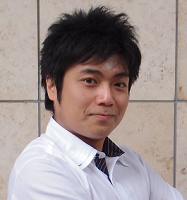 Dr Honda is Assistant Professor of Chemistry at the University of Tokyo (Japan), where his research focuses on the synthesis of polymers with complex architectures, the construction of functional nanostructures, and the development of stimuli-responsive soft materials. He received his PhD from Tokyo Institute of Technology in 2013 for his work on the synthesis and self-assembly of cyclic polymers with Professor Yasuyuki Tezuka. Following his PhD, he spent two years at the Tokyo University of Science as Specially Appointed Assistant Professor. He joined the University of Tokyo faculty as Assistant Professor in 2015 and was named an Excellent Young Researcher in 2018. During his current position (2018-2019), he engaged in ring opening polymerization of unusual cyclic molecules with organic catalysts with Professor Robert M. Waymouth at Stanford University as a Visiting Scholar. He is the recipient of the Young Scientists’ Prize, Commendation for Science and Technology by Japan Minister of Education, Culture, Sports, Science and Technology, 2020.
Dr Honda is Assistant Professor of Chemistry at the University of Tokyo (Japan), where his research focuses on the synthesis of polymers with complex architectures, the construction of functional nanostructures, and the development of stimuli-responsive soft materials. He received his PhD from Tokyo Institute of Technology in 2013 for his work on the synthesis and self-assembly of cyclic polymers with Professor Yasuyuki Tezuka. Following his PhD, he spent two years at the Tokyo University of Science as Specially Appointed Assistant Professor. He joined the University of Tokyo faculty as Assistant Professor in 2015 and was named an Excellent Young Researcher in 2018. During his current position (2018-2019), he engaged in ring opening polymerization of unusual cyclic molecules with organic catalysts with Professor Robert M. Waymouth at Stanford University as a Visiting Scholar. He is the recipient of the Young Scientists’ Prize, Commendation for Science and Technology by Japan Minister of Education, Culture, Sports, Science and Technology, 2020.
Lab webpage
Read our interview with Satoshi for Nature Japan (jp version; en version).
Nathalie Katsonis, PhD, University of Groningen, Netherlands
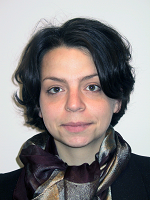 Dr Nathalie Katsonis is Professor of Chemistry at the University of Groningen (The Netherlands), where she leads a research group dedicated to the design and synthesis of active (supra)-molecular systems and materials. She obtained her PhD from the University Pierre et Marie Curie (France) in 2004, for her work on chirality and order in molecular self-assemblies. After a postdoctoral stay in the group of Ben Feringa, she became Associate Researcher at the French National Centre for Scientific Research (CNRS), moving to the University of Twente in 2011, and to the University of Groningen in 2020. Nathalie has been elected to the Young Academy of the Royal Netherlands Academy of Arts and Sciences, is Board Member of the van't Hoff Foundation for the promotion of chemistry, and she is the recipient of the Gold Medal of the Royal Netherlands Chemical Society.
Dr Nathalie Katsonis is Professor of Chemistry at the University of Groningen (The Netherlands), where she leads a research group dedicated to the design and synthesis of active (supra)-molecular systems and materials. She obtained her PhD from the University Pierre et Marie Curie (France) in 2004, for her work on chirality and order in molecular self-assemblies. After a postdoctoral stay in the group of Ben Feringa, she became Associate Researcher at the French National Centre for Scientific Research (CNRS), moving to the University of Twente in 2011, and to the University of Groningen in 2020. Nathalie has been elected to the Young Academy of the Royal Netherlands Academy of Arts and Sciences, is Board Member of the van't Hoff Foundation for the promotion of chemistry, and she is the recipient of the Gold Medal of the Royal Netherlands Chemical Society.
Lab webpage
Ga-Lai Law, PhD, Hong Kong Polytechnic University, Hong Kong
https://orcid.org/0000-0002-2192-6887
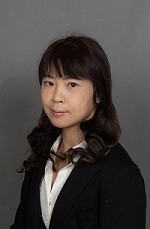 Ga-Lai Law is a Full Professor at The Hong Kong Polytechnic University at the Department of Applied Biology and Chemical Technology. She read Chemistry at The University of Manchester where she obtained her MChem, before moving across to Asia to The University of Hong Kong for a DPhil. Following, she pursued her interests in the f elements by joining David Parker’s group in Durham, and later Kenneth N Raymond at UC Berkeley, California. She then started her independent career at The Hong Kong Polytechnic University where she has established her research group. Currently her research focuses on interdisciplinary research with the f-elements. Some key areas are on lanthanide supramolecular compounds/complexes in developing molecular edifices for photoluminescence and bio-applications especially in the area of diagnostics, molecular imaging and chiroptical properties
Ga-Lai Law is a Full Professor at The Hong Kong Polytechnic University at the Department of Applied Biology and Chemical Technology. She read Chemistry at The University of Manchester where she obtained her MChem, before moving across to Asia to The University of Hong Kong for a DPhil. Following, she pursued her interests in the f elements by joining David Parker’s group in Durham, and later Kenneth N Raymond at UC Berkeley, California. She then started her independent career at The Hong Kong Polytechnic University where she has established her research group. Currently her research focuses on interdisciplinary research with the f-elements. Some key areas are on lanthanide supramolecular compounds/complexes in developing molecular edifices for photoluminescence and bio-applications especially in the area of diagnostics, molecular imaging and chiroptical properties
Lab webpage
Teodoro Laino, PhD, IBM Research, Switzerland
Dr Teodoro Laino received his Masters degree in theoretical chemistry in 2001 (University of Pisa and Scuola Normale Superiore di Pisa, Italy) and a doctorate in computational chemistry in 2006 (Scuola Normale Superiore di Pisa, Italy) defending a thesis on 'Multi-Grid QM/ MM Approaches in ab initio Molecular Dynamics'. From 2006 to 2008, Teo worked as a post-doctoral researcher at the University of Zurich, contributing to the development of the CP2K simulation package. In 2008, Teo joined the IBM Research - Zurich Laboratory (ZRL) as Research Scientist. He is currently Distinguished Research Scientist and manager.
Personal webpage
Chris Y. Li, PhD, University of Buffalo, USA
https://orcid.org/0000-0002-9559-7051
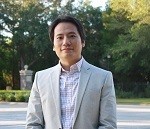 Prof. Chris Li is currently an Assistant Professor at the University at Buffalo, SUNY. Chris worked as an R&D engineer in chemical industries for three years before starting his Ph.D. in Chemistry (2013 - 2018) at Pennsylvania State with Prof. Tom Mallouk. From 2018 – 2020, Chris joined Prof. Ted Sargent’s group as a postdoctoral scholar at the University of Toronto. At the University at Buffalo, SUNY, Chris’ research group focus on developing electroanalytical techniques to study chemical mechanisms in electrocatalysis reactions, and reactor design for energy storage and environmental applications.
Prof. Chris Li is currently an Assistant Professor at the University at Buffalo, SUNY. Chris worked as an R&D engineer in chemical industries for three years before starting his Ph.D. in Chemistry (2013 - 2018) at Pennsylvania State with Prof. Tom Mallouk. From 2018 – 2020, Chris joined Prof. Ted Sargent’s group as a postdoctoral scholar at the University of Toronto. At the University at Buffalo, SUNY, Chris’ research group focus on developing electroanalytical techniques to study chemical mechanisms in electrocatalysis reactions, and reactor design for energy storage and environmental applications.
Personal webpage
Jun Lu, PhD, Zhejiang University, China
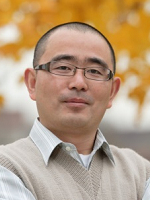 Prof. Jun Lu is a chair professor at Zhejiang University and the Dean of Quzhou Power Battery and Energy Storage Research Institute. His research focuses on electrochemical energy storage and conversion technology, with the main focus on beyond Li-ion battery technology. He earned his Bachelors degree from the University of Science and Technology of China (USTC) in 2000. He obtained his Ph.D. from the Department of Metallurgical Engineering at the University of Utah (USA) in 2009 with research directed towards metal hydrides for reversible hydrogen storage applications. He received many awards in the field of electrochemical energy storage and conversion throughout his career including IBA Research Award (2022), ECS Battery Division Technology Award (2022); Research Excellence Award in Electrochemical Energy Storage (EES Award), ACS ENFL Division (2022); IBA Early Career Award (2020); R&D 100 Award (2019), and Emerging Researcher Award of ACS ENFL (2019).
Prof. Jun Lu is a chair professor at Zhejiang University and the Dean of Quzhou Power Battery and Energy Storage Research Institute. His research focuses on electrochemical energy storage and conversion technology, with the main focus on beyond Li-ion battery technology. He earned his Bachelors degree from the University of Science and Technology of China (USTC) in 2000. He obtained his Ph.D. from the Department of Metallurgical Engineering at the University of Utah (USA) in 2009 with research directed towards metal hydrides for reversible hydrogen storage applications. He received many awards in the field of electrochemical energy storage and conversion throughout his career including IBA Research Award (2022), ECS Battery Division Technology Award (2022); Research Excellence Award in Electrochemical Energy Storage (EES Award), ACS ENFL Division (2022); IBA Early Career Award (2020); R&D 100 Award (2019), and Emerging Researcher Award of ACS ENFL (2019).
Michael Meanwell, PhD, University of Alberta, Canada
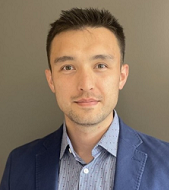 Dr Meanwell is the Manley and Marian Johnston Professor of Chemistry at the University of Alberta in Canada. His research is currently focused in three distinct areas: 1) leveraging electrocatalysis for the discovery of new chemical reactions, 2) invention of new processes for nucleoside analogue synthesis, and 3) total synthesis of bioactive natural products. He previously completed his PhD in 2020 at Simon Fraser University under the supervision of Professor Robert Britton where he worked on C-H functionalization and de novo glycoside synthesis. Dr Meanwell then continued his training as a Banting Postdoctoral Fellow in the laboratories of Professor Phil Baran at the Scripps Research Institute working on electrocatalysis and natural product synthesis. In 2022, he began his independent career at the University of Alberta.
Dr Meanwell is the Manley and Marian Johnston Professor of Chemistry at the University of Alberta in Canada. His research is currently focused in three distinct areas: 1) leveraging electrocatalysis for the discovery of new chemical reactions, 2) invention of new processes for nucleoside analogue synthesis, and 3) total synthesis of bioactive natural products. He previously completed his PhD in 2020 at Simon Fraser University under the supervision of Professor Robert Britton where he worked on C-H functionalization and de novo glycoside synthesis. Dr Meanwell then continued his training as a Banting Postdoctoral Fellow in the laboratories of Professor Phil Baran at the Scripps Research Institute working on electrocatalysis and natural product synthesis. In 2022, he began his independent career at the University of Alberta.
Lab webpage
David Nelson, PhD, University of Strathclyde, UK
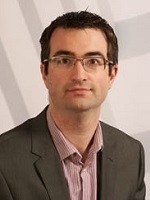 Dr Nelson is a Senior Lecturer in the Department of Pure and Applied Chemistry at the University of Strathclyde (UK). His research group study the mechanisms and structure/reactivity relationships of a range of reactions that are deployed in synthetic organic chemistry, most of which are catalysed by well-defined transition metal complexes. Current areas of focus include nickel-catalysed cross-coupling reactions and C-H functionalisation reactions. He obtained his PhD from the University of Strathclyde in 2012 for a thesis on structure/reactivity relationships in ring-closing metathesis (with Professor J. M. Percy) before carrying out postdoctoral research at the University of St Andrews (with Professor S. P. Nolan). He started his academic position at Strathclyde in 2014 as one of the inaugural cohort of 'Chancellor's Fellows' and was promoted to Senior Lecturer in late 2018. He was a Thieme Chemistry Journals Awardee in 2020.
Dr Nelson is a Senior Lecturer in the Department of Pure and Applied Chemistry at the University of Strathclyde (UK). His research group study the mechanisms and structure/reactivity relationships of a range of reactions that are deployed in synthetic organic chemistry, most of which are catalysed by well-defined transition metal complexes. Current areas of focus include nickel-catalysed cross-coupling reactions and C-H functionalisation reactions. He obtained his PhD from the University of Strathclyde in 2012 for a thesis on structure/reactivity relationships in ring-closing metathesis (with Professor J. M. Percy) before carrying out postdoctoral research at the University of St Andrews (with Professor S. P. Nolan). He started his academic position at Strathclyde in 2014 as one of the inaugural cohort of 'Chancellor's Fellows' and was promoted to Senior Lecturer in late 2018. He was a Thieme Chemistry Journals Awardee in 2020.
Lab webpage
Alina Sekretareva, PhD, Uppsala University, Sweden
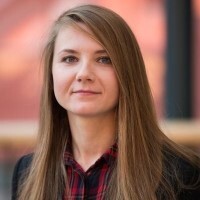 Dr Alina Sekretareva is an Assistant Professor and Docent in the Department of Chemistry-Ångström at Uppsala University, Sweden. Her research group focuses on understanding and controlling electron transfer processes in catalysis, encompassing a wide range of systems—from biological electron transfer in enzymes to photoelectrocatalytic processes on plasmonic nanostructures. The particular emphasis of the group is on the development of single-entity electrochemical methods for studying electron transfer processes at the single molecule/particle level. Dr Sekretareva earned her Ph.D. in Applied Physics at Linköping University, Sweden, working under the supervision of Prof. Anthony Turner and Prof. Mats Eriksson. With a prestigious Wallenberg Postdoctoral Fellowship, she subsequently joined Prof Edward Solomon's world-famous lab in the Department of Chemistry at Stanford University in the United States. Dr. Sekretareva is a recipient of the prize from King Carl XVI Gustaf's 50th-anniversary Foundation and the Göran Gustafsson Prize in Technical Physics.
Dr Alina Sekretareva is an Assistant Professor and Docent in the Department of Chemistry-Ångström at Uppsala University, Sweden. Her research group focuses on understanding and controlling electron transfer processes in catalysis, encompassing a wide range of systems—from biological electron transfer in enzymes to photoelectrocatalytic processes on plasmonic nanostructures. The particular emphasis of the group is on the development of single-entity electrochemical methods for studying electron transfer processes at the single molecule/particle level. Dr Sekretareva earned her Ph.D. in Applied Physics at Linköping University, Sweden, working under the supervision of Prof. Anthony Turner and Prof. Mats Eriksson. With a prestigious Wallenberg Postdoctoral Fellowship, she subsequently joined Prof Edward Solomon's world-famous lab in the Department of Chemistry at Stanford University in the United States. Dr. Sekretareva is a recipient of the prize from King Carl XVI Gustaf's 50th-anniversary Foundation and the Göran Gustafsson Prize in Technical Physics.
Lab webpage
Ulyana Shimanovich, PhD, Weizmann Institute of Science, Israel
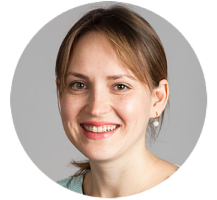 Dr Ulyana Shimanovich studied chemistry at the Bar-Ilan University where she obtained her PhD. In 2012 she was elected to a Fulbright fellowship as well as to a Women in Science fellowship, and she conducted her postdoctoral training at the Department of Chemistry, University of Cambridge UK. In 2016 Ulyana joined the Department of Molecular Chemistry and Materials Science, Weizmann Institute of Science (Israel) as a Senior Scientist (equivalent to Assistant Professor). She has published over 60 papers, and has an h-index of 25. She is the recipient of multiple national and international prizes, including the “Alon” Fellowship for Outstanding Young Researchers, Israeli Council of Higher Education (Israel) and the FEBS Scientific Excellence Award (Europe).
Dr Ulyana Shimanovich studied chemistry at the Bar-Ilan University where she obtained her PhD. In 2012 she was elected to a Fulbright fellowship as well as to a Women in Science fellowship, and she conducted her postdoctoral training at the Department of Chemistry, University of Cambridge UK. In 2016 Ulyana joined the Department of Molecular Chemistry and Materials Science, Weizmann Institute of Science (Israel) as a Senior Scientist (equivalent to Assistant Professor). She has published over 60 papers, and has an h-index of 25. She is the recipient of multiple national and international prizes, including the “Alon” Fellowship for Outstanding Young Researchers, Israeli Council of Higher Education (Israel) and the FEBS Scientific Excellence Award (Europe).
Lab webpage
Per-Olof Syren, PhD, KTH Royal Institute of Technology, Sweden
https://orcid.org/0000-0002-4066-2776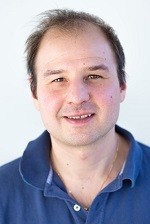 Dr Syrén is currently an Associate Professor in Chemistry for Life Sciences at KTH Royal Institute of Technology in Sweden. After spending 1 year at UC Berkeley (group of Prof. Jack F Kirsch) during his MSc studies, Dr Syrén performed his MSc thesis project in industry at AstraZeneca. He earned his Ph.D. in biotechnology from KTH in 2011 (supervisor Prof. Karl Hult). Following a postdoc in the laboratory of Prof. Bernhard Hauer in Stuttgart as an Alexander von Humboldt Fellow, Dr. Syrén returned to Sweden and KTH to start his independent scientific career. His research program bridges biotechnology and protein engineering with chemistry and material science for applications in green chemistry. In 2019, he was awarded the competence development award from his Majesty King Carl XVI Gustaf of Sweden and the Gunnar Sundblad Research Foundation for his pioneering work on polymer retrobiosynthesis as a tool to access monomers from biomass by biocatalysis.
Dr Syrén is currently an Associate Professor in Chemistry for Life Sciences at KTH Royal Institute of Technology in Sweden. After spending 1 year at UC Berkeley (group of Prof. Jack F Kirsch) during his MSc studies, Dr Syrén performed his MSc thesis project in industry at AstraZeneca. He earned his Ph.D. in biotechnology from KTH in 2011 (supervisor Prof. Karl Hult). Following a postdoc in the laboratory of Prof. Bernhard Hauer in Stuttgart as an Alexander von Humboldt Fellow, Dr. Syrén returned to Sweden and KTH to start his independent scientific career. His research program bridges biotechnology and protein engineering with chemistry and material science for applications in green chemistry. In 2019, he was awarded the competence development award from his Majesty King Carl XVI Gustaf of Sweden and the Gunnar Sundblad Research Foundation for his pioneering work on polymer retrobiosynthesis as a tool to access monomers from biomass by biocatalysis.
Lab webpage.
Andy Wilson, PhD, University of Birmingham, UK
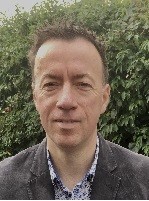 Prof Andy Wilson received a BSc (Hons) 1st class at The University of Manchester Institute of Science and Technology (UMIST) and then undertook his PhD in synthetic chemistry with Professor David A. Leigh FRS on Interlocked Architectures, firstly at UMIST then at The University of Warwick. He then carried out post-doctoral research at Yale University (USA) with Professor Andrew D. Hamilton FRS on the topic of protein surface recognition, followed by further postdoctoral research with Professors E. W. (Bert) Meijer and Rint P. Sijbesma at Eindhoven University of Technology (The Netherlands) on the topic of supramolecular polymers. In 2004 he took up his first independent academic position as a Research Lecturer at The University of Leeds, where he was promoted to Professor of Organic Chemistry in 2012 and served as Deputy Director of the Astbury Centre for Structural Molecular Biology (2012-2018). Andy moved to the University of Birmingham as Professor of Organic Chemistry in 2023. Andy’s research interests focus on understanding and modulating protein-protein interactions, studies of peptide and protein (mis)assembly, methods for structural and chemical proteomics, fundamental supramolecular chemistry and self-assembled materials. Andy’s research was recognized through the Royal Society of Chemistry (RSC) Bob Hay Lectureship (2012) and the RSC Norman Heatley Award (2016).
Prof Andy Wilson received a BSc (Hons) 1st class at The University of Manchester Institute of Science and Technology (UMIST) and then undertook his PhD in synthetic chemistry with Professor David A. Leigh FRS on Interlocked Architectures, firstly at UMIST then at The University of Warwick. He then carried out post-doctoral research at Yale University (USA) with Professor Andrew D. Hamilton FRS on the topic of protein surface recognition, followed by further postdoctoral research with Professors E. W. (Bert) Meijer and Rint P. Sijbesma at Eindhoven University of Technology (The Netherlands) on the topic of supramolecular polymers. In 2004 he took up his first independent academic position as a Research Lecturer at The University of Leeds, where he was promoted to Professor of Organic Chemistry in 2012 and served as Deputy Director of the Astbury Centre for Structural Molecular Biology (2012-2018). Andy moved to the University of Birmingham as Professor of Organic Chemistry in 2023. Andy’s research interests focus on understanding and modulating protein-protein interactions, studies of peptide and protein (mis)assembly, methods for structural and chemical proteomics, fundamental supramolecular chemistry and self-assembled materials. Andy’s research was recognized through the Royal Society of Chemistry (RSC) Bob Hay Lectureship (2012) and the RSC Norman Heatley Award (2016).
Group Webpage
Kristin Wustholz, PhD, William & Mary, USA
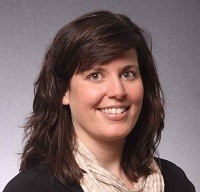 Dr Kristin Wustholz is an Associate Professor of Chemistry at William & Mary (USA), where her research group focuses on using spectroscopy to probe the optical and structural properties of chromophores in environments that are inherently complex. She received a Ph.D. in chemistry from the University of Washington in 2007, for her work examining molecular alignment and photophysics in dyed salt crystals. Her research as a postdoctoral fellow with Richard P. Van Duyne at Northwestern University focused on elucidating structure-property relationships in plasmonic materials using single-molecule and single-nanoparticle surface-enhanced Raman spectroscopy (SERS). In 2009 she was awarded the American Chemical Society Award for Excellence in Postdoctoral Research. Kristin joined the chemistry department at William & Mary in 2010, where her current research involves understanding the interfacial interactions and electron transfer properties of chromophores at semiconductor and metal interfaces for applications to solar energy conversion, super-resolution imaging, and art conservation. In 2016 she was awarded the Henry Dreyfus Teacher-Scholar Award.
Dr Kristin Wustholz is an Associate Professor of Chemistry at William & Mary (USA), where her research group focuses on using spectroscopy to probe the optical and structural properties of chromophores in environments that are inherently complex. She received a Ph.D. in chemistry from the University of Washington in 2007, for her work examining molecular alignment and photophysics in dyed salt crystals. Her research as a postdoctoral fellow with Richard P. Van Duyne at Northwestern University focused on elucidating structure-property relationships in plasmonic materials using single-molecule and single-nanoparticle surface-enhanced Raman spectroscopy (SERS). In 2009 she was awarded the American Chemical Society Award for Excellence in Postdoctoral Research. Kristin joined the chemistry department at William & Mary in 2010, where her current research involves understanding the interfacial interactions and electron transfer properties of chromophores at semiconductor and metal interfaces for applications to solar energy conversion, super-resolution imaging, and art conservation. In 2016 she was awarded the Henry Dreyfus Teacher-Scholar Award.
Lab webpage
Kui Yu, PhD, Sichuan University, China
 Dr Yu is a full-time Professor at Sichuan University (China), focusing on the fundamental study of the evolution pathway of compound semiconductor colloidal nanomaterials. She earned her PhD from Department of Chemistry, McGill University (Canada) in 2000, for her work on the self-assembly of di-block copolymers in dilute solution. She went to Sandia National Laboratories (USA) as a post-doc fellow and a limited term employee, working on the synthesis of meso-porous silica thin films (templated by di-block copolymers). In 2002, she joined the National Research Council of Canada (NRC) in Ottawa as an Assistant Research Officer, and was entitled Senior Research Officer after Associate Research Officer. Since 2002, she started her independent research career, focusing on the fundamental understanding of the synthesis-structure-property relationship of colloidal semiconductor quantum dots (QDs). In 2014, she joined Sichuan University, continuing her fundamental research on QDs; she discovered an additional pathway in the prenucleation stage of the QDs, which involves the self-assembly of starting materials. She is an awardee of Yangtze River Scholarship from the Chinese Ministry of Education.
Dr Yu is a full-time Professor at Sichuan University (China), focusing on the fundamental study of the evolution pathway of compound semiconductor colloidal nanomaterials. She earned her PhD from Department of Chemistry, McGill University (Canada) in 2000, for her work on the self-assembly of di-block copolymers in dilute solution. She went to Sandia National Laboratories (USA) as a post-doc fellow and a limited term employee, working on the synthesis of meso-porous silica thin films (templated by di-block copolymers). In 2002, she joined the National Research Council of Canada (NRC) in Ottawa as an Assistant Research Officer, and was entitled Senior Research Officer after Associate Research Officer. Since 2002, she started her independent research career, focusing on the fundamental understanding of the synthesis-structure-property relationship of colloidal semiconductor quantum dots (QDs). In 2014, she joined Sichuan University, continuing her fundamental research on QDs; she discovered an additional pathway in the prenucleation stage of the QDs, which involves the self-assembly of starting materials. She is an awardee of Yangtze River Scholarship from the Chinese Ministry of Education.
Lab webpage
Wei Zhang, PhD, Jilin University, China
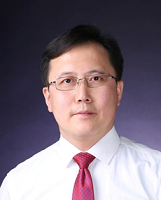 Dr Zhang is currently a full Professor (TANG Auchin Scholar-Leading Professor since 2020) and the director of the Electron Microscopy Center at Jilin University (China). He earned his PhD from the Institute of Metal Research, Chinese Academy of Sciences in 2004, for his work on clarification of microstructural evolution and mechanism of conventional materials under electropulsing. Then he held academic positions at the National Institute for Materials Science (Japan), Samsung Advanced Institute of Technology (South Korea), Fritz Haber Institute of the Max Planck Society (Germany), Technical University of Denmark, and CIC Energigune (Spain). In 2016, Dr Zhang was awarded Ikerbasque Research Professor. He discovered the battery-mimic mechanism and diffusionless phase transition-like conversion reaction promoted bulk-utilization in pseudocapacitance, and proposed a thin-film theory-based strategy of suppressing lithium dendrites via tuning surface energy. He was elected as deputy president for the Electron Microscopy Society of Jilin Province. His current research focuses on surface and interface chemistry of advanced materials toward applications in electrochemical energy storage and conversion, electrocatalysis, and heterogeneous catalysis.
Dr Zhang is currently a full Professor (TANG Auchin Scholar-Leading Professor since 2020) and the director of the Electron Microscopy Center at Jilin University (China). He earned his PhD from the Institute of Metal Research, Chinese Academy of Sciences in 2004, for his work on clarification of microstructural evolution and mechanism of conventional materials under electropulsing. Then he held academic positions at the National Institute for Materials Science (Japan), Samsung Advanced Institute of Technology (South Korea), Fritz Haber Institute of the Max Planck Society (Germany), Technical University of Denmark, and CIC Energigune (Spain). In 2016, Dr Zhang was awarded Ikerbasque Research Professor. He discovered the battery-mimic mechanism and diffusionless phase transition-like conversion reaction promoted bulk-utilization in pseudocapacitance, and proposed a thin-film theory-based strategy of suppressing lithium dendrites via tuning surface energy. He was elected as deputy president for the Electron Microscopy Society of Jilin Province. His current research focuses on surface and interface chemistry of advanced materials toward applications in electrochemical energy storage and conversion, electrocatalysis, and heterogeneous catalysis.
Lab webpage
Yanli Zhao, PhD, Nanyang Technological University, Singapore
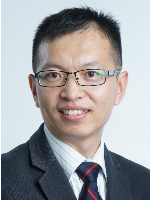 Dr Zhao is a Professor at the School of Physical and Mathematical Sciences as well as the School of Materials Science and Engineering in Nanyang Technological University (Singapore). He received his undergraduate degree and his PhD from Nankai University (China). He was a postdoctoral scholar at University of California Los Angeles and subsequently at Northwestern University (USA). He has published over 300 scientific papers, and received several national and international awards including the Singapore National Research Foundation Investigatorship in 2018, the ACS Applied Materials & Interfaces Young Investigator Award in 2017, the Asian and Oceanian Photochemistry Association Prize for Young Scientists in 2016, the TR35@Singapore Award in 2012, and the Singapore National Research Foundation Fellowship in 2010. His current research focuses on the development of integrated synthetic systems for nanomedicine, gas storage and conversion, and heterogeneous catalysis.
Dr Zhao is a Professor at the School of Physical and Mathematical Sciences as well as the School of Materials Science and Engineering in Nanyang Technological University (Singapore). He received his undergraduate degree and his PhD from Nankai University (China). He was a postdoctoral scholar at University of California Los Angeles and subsequently at Northwestern University (USA). He has published over 300 scientific papers, and received several national and international awards including the Singapore National Research Foundation Investigatorship in 2018, the ACS Applied Materials & Interfaces Young Investigator Award in 2017, the Asian and Oceanian Photochemistry Association Prize for Young Scientists in 2016, the TR35@Singapore Award in 2012, and the Singapore National Research Foundation Fellowship in 2010. His current research focuses on the development of integrated synthetic systems for nanomedicine, gas storage and conversion, and heterogeneous catalysis.
Lab webpage
Interested in joining the editorial board?
We will be expanding our editorial board as the journal grows. If you are interested in becoming an Editorial Board Member for Communications Chemistry, please complete this Google form. If you are unable to use Google forms, you may contact us with your CV and/or link to your lab webpage, the subject areas you would like to cover for the journal, and a brief statement about why you are interested in an editorial board member position. Please note that your personal information, including name and email address, will be kept by the in-house editors for the sole purpose of identifying potential editorial board members. If you would like us to delete your information at any time, please contact us.

